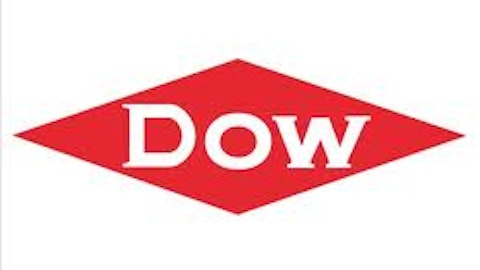Matt DiLallo’s take
While there are compelling arguments to curb exporting our excess gas, I’m not completely convinced by the logic behind protecting our production. It wasn’t that long ago that we feared that we wouldn’t have enough natural gas to support our economy. To lock up supply, we built several natural gas import facilities, such as Dominion Resources, Inc. (NYSE:D)‘s Cove Point LNG Terminal in Maryland. Today, this terminal and others like it are being prepped for export.
Why is it OK for our country to import gas when we needed it, but it’s not a good idea to export it when we have it in abundance? It is true that exporting gas would increase the cost to consumers both small and large. However, would you carry the logic and suggest we shouldn’t export corn because it makes the costs go up for consumers? If we want to be part of the global economy, then we need to give in the same way that we take.
Now, I don’t favor unfettered exports. Instead there should be rules governing our gas exports, just as rules govern the rest of our economy. I’d favor a slow ramp-up of exports tied to production targets and pricing. I’d also not be opposed to placing a tariff on exports if, and only if, those funds are used to increase the availability of renewable energy in the United States.
The other thing to consider is that higher-cost natural gas isn’t such a bad idea. Sure, it’ll crimp profits at the heavy users, but it also will spur new drilling activity, which would create jobs. Finally, there’s something to be said for scarcity. If gas were more valuable, we wouldn’t see it being flared with abandon in places such as the Bakken. Instead, we’d protect its value. Cheap gas makes us lazy, just as expensive oil causes us to conserve.
Tyler Crowe’s take
We export massive quantities of coal to China and India, we refine gasoline and diesel for Venezuela, and according to the EIA, each year we export 1.6 trillion cubic feet of — you guessed it — natural gas to places all around the world. The lion’s share of that went to our free-trade partners in Canada and Mexico, but some of that did make its way to non-free trade partners, including India, Japan, and Brazil. So it seems a bit odd to argue against something we already do.
If there’s a market out there for it, then by all means pursue that market. What concerns me more is that the LNG export business will have diminishing returns for two major reasons:
Increased domestic demand. Domestic companies want to take advantage of this cheap resource, too. There are the obvious ones, such as utility companies, but we also have chemical companies such as Enterprise Products Partners L.P. (NYSE:EPD) and The Dow Chemical Company (NYSE:DOW) building massive facilities to crack ethane for chemical feedstocks, and innovative thinkers Westport Innovations Inc. (USA) (NASDAQ:WPRT) and Clean Energy Fuels Corp (NASDAQ:CLNE) that are turning the idea of natural gas as a transportation fuel into a reality. When demand picks up in the U.S., local prices will go with it.
Lower natural gas prices in foreign markets. It took less than a decade for the U.S. to realize our natural gas boom, and several countries have proven that they have very large shale deposits as well. We have proven that the technology is out there to access these resources in an economical manner. So when they do tap these sources, foreign prices will start to drop much like they did here.
Both of these elements could squeeze margins for LNG exporters from either end, and it could potentially price them out of profitability. So feel free to export — just know that these two elements are working against you.
Foolish bottom line
The debate will continue over whether the U.S. should use cheap natural gas to spur new uses here or export it for a profit to other parts of the world. Weigh in with your thoughts in our comments section below.
The article What’s the Best Natural Gas Policy for the United States? originally appeared on Fool.com and is written by Travis Hoium, Tyler Crowe, Matt DiLallo, and Maxx Chatsko
Fool contributor Matt DiLallo owns shares of Enterprise Products Partners and Westport Innovations. Fool contributors Maxx Chatsko and Travis Hoium have no position in any stocks mentioned. Fool contributor Tyler Crowe owns shares of Westport Innovations. The Motley Fool recommends Clean Energy Fuels, Dominion Resources, Enterprise Products Partners, and Westport Innovations and owns shares of Westport Innovations.
Copyright © 1995 – 2013 The Motley Fool, LLC. All rights reserved. The Motley Fool has a disclosure policy.




